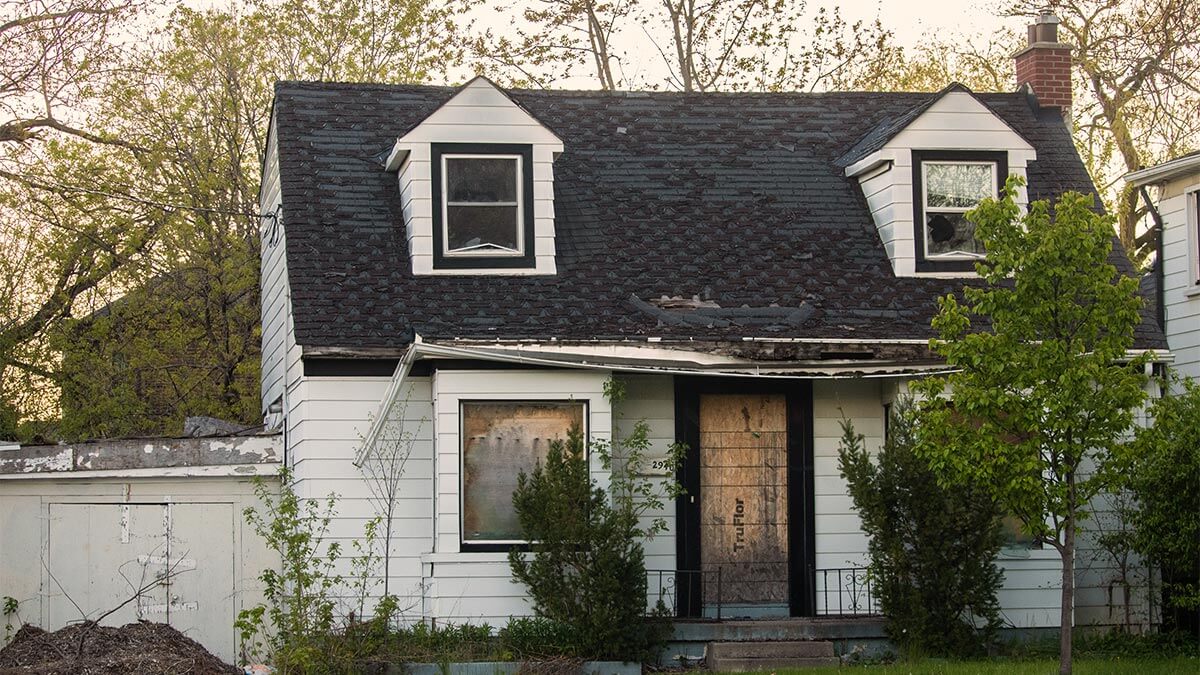A condemned house is a property deemed unfit for habitation by local government authorities due to severe safety or health hazards. This declaration can stem from various reasons, such as structural damage, extensive mold growth, or the presence of hazardous materials like asbestos or lead. Houses can also be condemned due to prolonged neglect, making them unsafe for occupancy or potentially causing harm to the surrounding community.
Navigating the complexities of selling a condemned house can be overwhelming. Fortunately, iBuyer services offer a straightforward solution by purchasing properties in any condition, including condemned houses. Reach out to iBuyer today for a free consultation and discover how you can sell your condemned house quickly and efficiently.
Compare Cash Offers from Top Home Buyers. Delivered by Your Local iBuyer Certified Specialist.
One Expert, Multiple Offers, No Obligation.
Selling a Condemned House
Legal Aspects of Selling a Condemned House
Ownership and Title Issues
When selling a condemned house, the first step is ensuring you have clear ownership and title to the property. Verifying property ownership might seem straightforward, but condemned houses often come with a history of neglect, which can complicate title issues.
It’s crucial to clear any liens, debts, or other encumbrances on the title before proceeding with the sale. This step ensures a smooth transaction and prevents legal disputes down the line.
Local Laws and Regulations
Understanding the local laws and regulations regarding condemned properties is equally important. These laws can vary significantly across different states and municipalities. Some areas might have specific requirements for disclosing the property’s condition, while others might mandate certain repairs before a sale can proceed.
Consulting with a real estate attorney who specializes in local real estate laws is invaluable. They can provide guidance on the necessary steps and help ensure compliance with all legal requirements, protecting you from potential legal pitfalls.
Steps to Prepare a Condemned House for Sale
1. Property Assessment
The first step in preparing a condemned house for sale is conducting a thorough property assessment. Hiring a professional inspector is essential to understand the full extent of the damage and the necessary repairs.
An inspector will provide a detailed report highlighting structural issues, safety hazards, and any code violations. This assessment is crucial for making informed decisions about the property’s future and determining the best course of action.
2. Create a Budget
Once the property assessment is complete, the next step is estimating repair costs. Create a comprehensive budget that outlines the expenses needed to bring the house up to code. This includes costs for materials, labor, and any additional fees for specialized repairs.
3. Decide on Renovation or Selling As-Is
Decide whether to undertake a full renovation or sell the house as-is. Full renovations can increase the property’s market value but require substantial investment. On the other hand, selling as-is might attract buyers looking for a project but at a lower sale price.
4. Research Local Building Codes
Familiarize yourself with local building codes and regulations to ensure all planned work complies with legal requirements. This step prevents future legal issues and ensures that the repairs are up to standard.
5. Obtain Necessary Permits
Obtain the necessary permits from your local government for any repairs or renovations. This includes permits for demolition if required. Working with a knowledgeable contractor who understands the permit process can streamline this step and ensure that all legal requirements are met.
Selling Options for a Condemned House
Selling to a Specialized Home Buying Company
Specialized home buying companies, such as iBuyer, offer a straightforward and hassle-free selling process. These companies purchase homes in any condition, including condemned properties, and provide fast cash offers.
Pros:
- Quick and convenient process.
- Avoid the complexities of repairs, marketing, and negotiating.
- Guaranteed sale with no need to worry about buyer financing falling through.
Cons:
- Offers might be lower than the market value.
- Limited room for negotiation on price.
Selling to Real Estate Investors
Another viable option is selling your condemned house to real estate investors, such as cash buyers or house flippers. These investors are often willing to purchase properties in any condition, as they specialize in renovations and reselling.
Pros:
- Fast and simple transaction.
- Cash deals allow for a quicker closing process.
- No need to invest in repairs or renovations.
Cons:
- Investors typically offer below market value.
- You need to find a reputable and trustworthy investor.
Selling at an Auction
Selling your condemned house at an auction can be an efficient way to attract multiple buyers and potentially get a good price. Auctions create a sense of urgency and competition among buyers.
Pros:
- Quick sale process.
- Competitive bidding can drive up the final price.
- Property is sold as-is, with no need for repairs.
Cons:
- Final sale price may be lower than expected.
- Auction fees and commissions can reduce net proceeds.
- Requires effective marketing to attract serious buyers.
Listing with a Real Estate Agent
Listing your condemned house with a real estate agent who specializes in distressed properties is another option. An experienced agent can help you set realistic expectations for the sale price and market the property effectively.
Pros:
- Potential for a higher sale price if marketed correctly.
- Professional guidance through the selling process.
- Access to a broader pool of potential buyers.
Cons:
- Longer time to sell compared to other methods.
- Need to pay agent commissions and fees.
- May require some repairs or improvements to make the property more appealing.
Marketing a Condemned House
Tips for Effective Marketing
- Highlight the Location
Emphasize the advantages of the property’s location, such as proximity to schools, parks, public transport, and shopping areas. - Showcase Land Value
Focus on the land’s potential, especially if it’s a large lot or situated in a growing neighborhood. - Feature Unique Characteristics
Highlight any remaining unique features, such as architectural details, large windows, or historical significance, to attract buyers interested in preserving or restoring these elements. - Be Transparent About Condition
Provide full disclosure about the property’s condition. Sharing inspection reports and repair estimates builds trust with potential buyers. - Target the Right Audience
Market the property to investors, developers, and buyers looking for renovation projects. Use specific platforms and networks that cater to this audience. - Use High-Quality Visuals
Even if the house is in poor condition, use high-quality photos and, if possible, virtual tours to give buyers a clear view of the property and its potential. - Create a Vision
Paint a picture of what the house could become with renovations. Use before-and-after photos of similar projects to inspire potential buyers. - Offer Flexible Viewing Times
Make it easy for potential buyers to view the property by offering flexible viewing times, including weekends and evenings. - Leverage Online Listings
Utilize online real estate platforms to reach a broader audience. Ensure your listing is detailed, informative, and highlights the potential of the property. - Consider Incentives
Offer incentives such as paying for closing costs or providing a discount for a quick sale to attract more buyers.
Financial Considerations
Pricing the Property
Setting the right price for a condemned house is crucial for attracting buyers while maximizing your return. Here are some key steps:
- Analyze Market Conditions: Research the local real estate market to understand current conditions. Look at comparable properties in similar conditions to gauge a competitive price.
- Consider the Cost of Repairs: Factor in the estimated cost of repairs when setting the price. Buyers will consider these costs, so pricing the property accordingly is essential to attract interest.
- Seek Professional Appraisal: Obtain a professional appraisal to get an accurate assessment of the property’s value. This helps set a realistic price that reflects the house’s true worth.
- Set a Competitive Price: Aim for a price that is attractive enough to generate interest but still provides a reasonable return. Avoid overpricing, as it can deter potential buyers.
Costs Involved in Selling
Selling a condemned house involves various costs that can impact your net proceeds. Here’s a breakdown:
- Repair and Renovation Costs: If you decide to make any repairs, include the cost of materials, labor, and permits.
- Real Estate Agent Fees: If you list with an agent, expect to pay a commission, typically around 5-6% of the sale price.
- Closing Costs: These can include title insurance, escrow fees, and attorney fees. Be prepared for these expenses to be around 2-5% of the sale price.
- Marketing Expenses: Costs for professional photography, listing fees, and advertising can add up.
- Inspection and Appraisal Fees: You might need to pay for an inspection and appraisal to help price the property and address buyer concerns.
- Property Taxes and Utilities: Ensure all property taxes and utility bills are up to date before the sale. These expenses can add up, especially if the property has been vacant.
Conclusion
Recap of Key Points
Selling a condemned house can be challenging, but understanding the process can help you navigate it successfully. Here’s a summary of the key points covered:
- Legal Aspects: Ensure clear ownership and title, and understand local laws and regulations by consulting with a real estate attorney.
- Preparation Steps: Conduct a thorough property assessment, create a budget for repairs, decide on renovation or selling as-is, research local building codes, and obtain necessary permits.
- Selling Options: Consider selling to a specialized home buying company, real estate investors, or at an auction. Listing with a real estate agent experienced in distressed properties is also an option.
- Marketing Strategies: Highlight the property’s potential, be transparent about its condition, target the right audience, and use high-quality visuals.
- Financial Considerations: Set a competitive price based on market conditions and repair costs, and account for all costs involved in selling, including agent fees, closing costs, and marketing expenses.
With the right approach, selling a condemned house can be a manageable and even profitable venture.
If you’re ready to sell your condemned house and want a hassle-free solution, consider reaching out to iBuyer. Our services are designed to make the selling process quick and efficient, regardless of the property’s condition.
Instant Valuation, Confidential Deals with a Certified iBuyer.com Specialist.
Sell Smart, Sell Fast, Get Sold. No Obligations.
Reilly Dzurick is a seasoned real estate agent at Get Land Florida, bringing over six years of industry experience to the vibrant Vero Beach market. She is known for her deep understanding of local real estate trends and her dedication to helping clients find their dream properties. Reilly’s journey in real estate is complemented by her academic background in Public Relations, Advertising, and Applied Communication from the University of North Florida.




